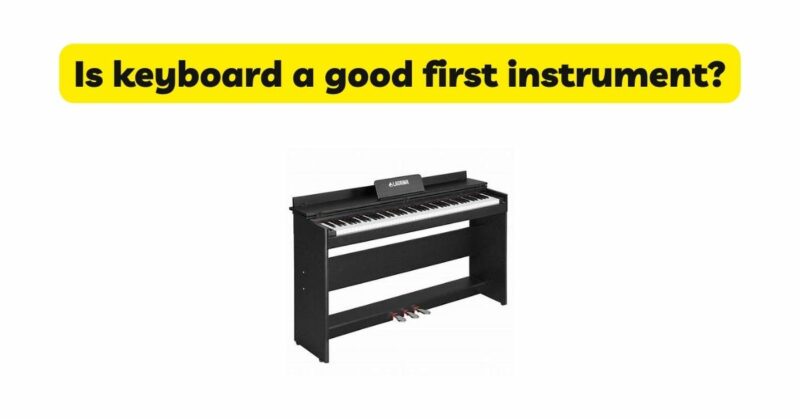Choosing the right instrument to begin your musical journey can be an exciting yet daunting decision. Among the numerous options available, the keyboard stands out as a versatile and accessible choice for beginners. In this article, we will explore the advantages and considerations of starting with a keyboard as a first instrument. By understanding its unique characteristics, learning opportunities, and practical aspects, you can confidently embrace the keyboard as your gateway to musical exploration and growth.
- Accessibility and Affordability: One of the primary advantages of starting with a keyboard as a first instrument is its accessibility and affordability. Keyboards are compact, portable, and require minimal space, making them suitable for beginners who may have limited room or need a portable instrument. Additionally, keyboards are generally more affordable than many other instruments, such as guitars or drums, which can require a larger financial investment. This accessibility and affordability make the keyboard an ideal choice for individuals who want to dip their toes into the world of music without breaking the bank.
- Versatility and Musical Exploration: The keyboard offers a wide range of musical possibilities and versatility, making it an excellent instrument for beginners who have diverse musical interests. Keyboards typically have various instrument sounds, including pianos, strings, organs, synthesizers, and more. This versatility allows beginners to explore different genres and experiment with various sounds, fostering creativity and musical exploration. Whether your interests lie in classical, pop, jazz, or electronic music, the keyboard provides a versatile platform to discover and develop your musical preferences.
- Learning Fundamentals: Learning the fundamentals of music theory and notation is an essential aspect of any musical journey. The keyboard offers a straightforward and visual representation of musical concepts. Its linear layout of keys makes it easier to understand intervals, scales, chords, and note relationships. This visual representation can accelerate the learning process, helping beginners grasp essential musical concepts and transfer their knowledge to other instruments in the future. The keyboard’s layout also provides a solid foundation for learning to read sheet music, understand rhythms, and develop aural skills.
- Technique Development: Developing proper technique is crucial for any musician, and the keyboard offers an excellent platform for beginners to establish sound playing habits. Keyboards often have lightweight keys and a responsive touch, allowing beginners to develop finger strength, dexterity, and control. While the touch sensitivity of keyboards may differ from acoustic pianos, many keyboards now feature weighted keys or graded hammer action, which simulate the feel of a traditional piano. Learning on a keyboard can help beginners build a strong technical foundation, preparing them for future endeavors on piano or other keyboard-based instruments.
- Learning Resources and Support: Another advantage of starting with a keyboard is the abundance of learning resources and support available. Numerous online tutorials, educational apps, and interactive lessons cater specifically to keyboard learners. These resources often provide step-by-step instructions, practice exercises, and even feedback on your performance. Additionally, keyboards often come with built-in features such as metronomes, recording capabilities, and accompaniment tracks, enhancing the learning experience and making practice sessions more enjoyable. The availability of learning resources and support can greatly enhance your progress as a beginner musician.
- Musical Collaboration and Performance Opportunities: The keyboard’s versatility and ability to produce various instrument sounds make it an excellent instrument for musical collaboration and performance. As a beginner, the keyboard allows you to play different instrumental parts in ensemble settings or accompany other musicians. This versatility can open doors to collaboration with vocalists, guitarists, or other instrumentalists. Furthermore, keyboards often have built-in rhythm patterns and accompaniments that can serve as virtual bands, enhancing your performance experience even as a beginner. This opens up opportunities to play and perform music with others, fostering growth and building musical confidence.
- Smooth Transition to Other Instruments: Learning to play the keyboard as a first instrument can also facilitate a smooth transition to other instruments in the future. The keyboard’s layout and understanding of musical concepts transfer well to other keyboard-based instruments such as piano, organ, or synthesizer. Additionally, the keyboard’s ability to produce a wide range of sounds and its emphasis on understanding music theory can provide a solid foundation for exploring other instruments. This versatility ensures that the skills and knowledge gained on the keyboard will be transferable and beneficial as you expand your musical horizons.
Conclusion: Starting your musical journey with a keyboard as a first instrument offers numerous advantages and opportunities for growth. Its accessibility, affordability, versatility, and learning resources make it an excellent choice for beginners. The keyboard provides a solid foundation for learning music theory, developing technique, and exploring various genres and sounds. As you progress, the skills acquired on the keyboard can easily be transferred to other instruments. Regardless of your musical aspirations, the keyboard allows you to dive into the world of music, collaborate with other musicians, and build a strong musical foundation. Embrace the keyboard as your first instrument and embark on a fulfilling and exciting musical adventure.


